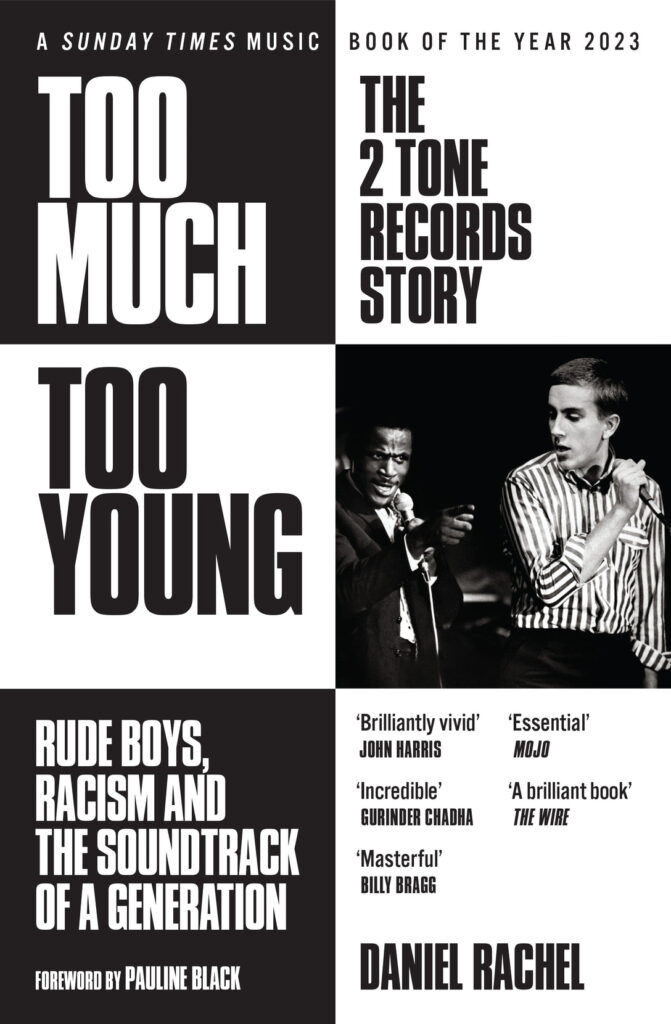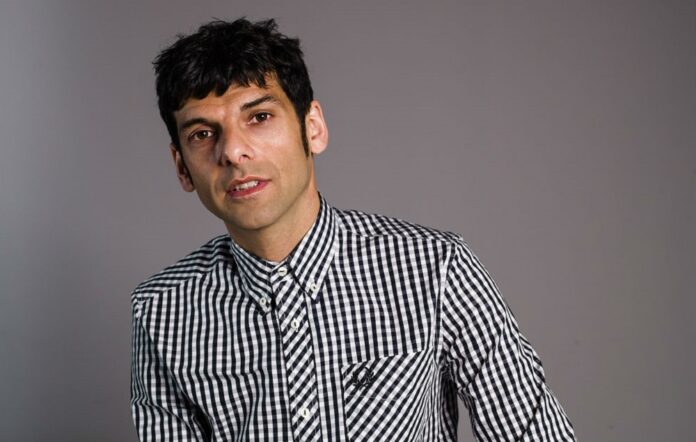Prolific Birmingham-born author Daniel Rachel has written a dozen books documenting British popular music. (A former musician himself, he has a unique take on the impact of the industry.) His most recent title, Too Much Too Young: Rude Boys, Racism, and the Soundtrack of a Generation, celebrates the ska bands of the late 1970s and early ’80s that, for a moment, seemed poised to give racism a strong moonstomp to the head. The book details the story of the iconic 2 Tone label, on which bands like The Specials, English Beat, The Selecter, Madness, Bodysnatchers, and more came together across class and racial divides to educate young people about social issues through their music while zapping the culture with irresistible energy and style.
Filled with interviews and insights, Too Much Too Young is a perfect follow-up to Rachel’s previous work, Walls Come Tumbling Down: The Music and Politics of Rock Against Racism, 2 Tone, and Red Wedge, an acclaimed oral history of the intersection of political activism and pop in the UK from 1976-1992. It also encourages a few of us to dust off those Hawkins creepers or checkerboard Vans and skank around a bit. In advance of his Sun/25 book launch party at Make-Out Room, SF, we spoke with Rachel about this exuberant and eclectic moment in music, and his exciting documentation.

48 HILLS Throughout Too Much Too Young, it’s obvious that this book isn’t just a purely journalistic project for you. Your enthusiasm and care for the music and musicians is evident throughout. What’s your connection to the 2 Tone movement?
DANIEL RACHEL Thank you! Well, firstly, I’ve never been a journalist. I’ve only ever written books. Before that I was a musician. I played rhythm guitar, sang, and wrote songs for over 20 years. As a schoolboy, 2 Tone swept me up. I saw all the bands on Top of the Pops, heard them on BBC Radio 1, bought the magazines, the badges, the clothes. And then eventually saw them live. UB40 and Madness were the first two. I sneaked backstage and then onto the stage when Madness played the Birmingham Odeon, and all the band signed my program. I’ve been hooked ever since.
48 HILLS How does a movement that lasts only a few years still have so much resonance today?
DANIEL RACHEL Two years of the first phase of 2 Tone were massive. Many movements barely lasted a year. 2 Tone—from early hits “Gangsters” and “Ghost Town” and then on to later classics “The Boiler” and “(Free) Nelson Mandela“—was a phenomenon that influenced vast swathes of British youth. It educated us about social and class divisions, gender struggles, male violence, rape, the African National Congress, racism. This was an education you did not receive from the school national curriculum. Naturally, if you’ve been so profoundly affected by that strength of force it will carry forward in your life. Moreover, the songs are just brilliant and everlasting.
48 HILLS The kind of memory work you do in a history like this requires the diplomacy skills of a foreign secretary. How do you work with contradictory accounts from the people you interview?
DANIEL RACHEL That’s easy. You just present both sides of an argument and let the reader decide.
48 HILLS Do you see any major differences between how US and UK audiences understand the 2 Tone phenomenon?
DANIEL RACHEL I’ve not landed in the US yet, but I’ve done a lot of interviews in advance. The British class divide which defines this country is seemingly overlooked by some when understanding 2 Tone. Class determines everything in the UK. We are a divided country separated between upper, middle, and working class. The non-spoken signs and signifiers within the hierarchy predetermine your role in society. Amongst the 2 Tone bands, musicians came from all echelons of the class system. When events turned sour, those class differences pulled people in differing directions.
Musically, 2 Tone drew on styles from the Caribbean Islands and crucially styles thereafter—so rock, funk, disco and punk. The combination of all those genres created 2 Tone, mixed with a heavy dose of social and political angst. Whether that breadth of influence informed the Third Wave of ska in the US in the ’90s, I’m not so sure.
48 HILLS Over the past few weeks, the UK has been rocked by a new wave of racist riots, and antiracist mobilizations. What examples from the histories of 2 Tone and Rock Against Racism might be helpful to blocking the appeal of nativism today?
DANIEL RACHEL [2 Tone label head] Jerry Dammers was intelligent enough to recognize that teenagers seek an identify that is defined independently from their parents. In 2 Tone, he offered a cultural pathway of great clothes, appealing artwork, and stomping dance tracks. Music was an expression of joyfulness and fun and an exciting alternative to bigotry and violence.
48 HILLS Can’t wait for your next book! What are you working on and when can we expect it?
DANIEL RACHEL It’s written. I just needs a publishing house to buy it. It is challenging, provocative, and explosive. Fingers crossed; it will be available by autumn 2025.
DANIEL RACHEL: TOO MUCH TOO YOUNG BOOK LAUNCH PARTY with DJs Paul Costuros and DJ.66, Sun/25, 7:30pm, Make-Out Room, SF. More info here.






